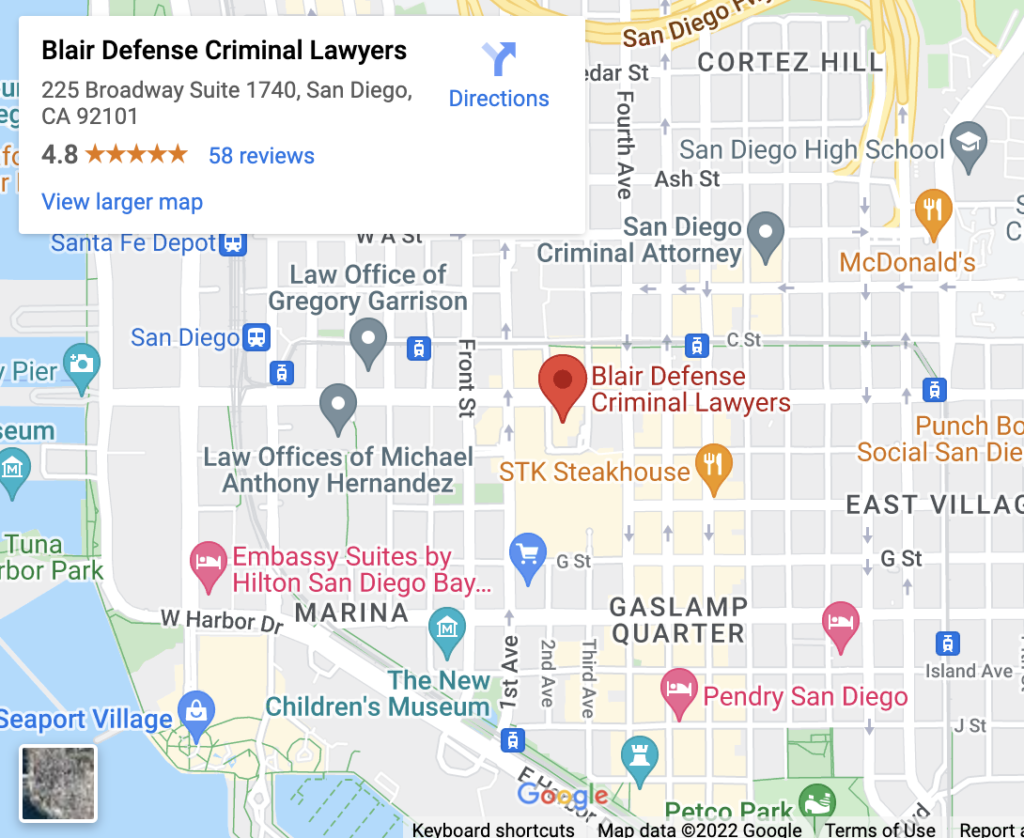
The term “felony” is almost universally defined as a crime that can land you in prison for more than a year. If the maximum sentence is one year or less, the crime is a misdemeanor, not a felony. The most serious felonies carry a maximum penalty of life without parole or the death penalty.
Table of Contents
California Felonies
It is useful to classify California as either “straight felonies” or “wobblers.”
Straight Felonies
Straight felonies are crimes that the prosecutor can only charge as a felony. Examples include serious offenses such as rape, murder, and drug trafficking.
Wobblers
“Wobblers” are offenses that the prosecutor can charge as either a felony or a misdemeanor, depending on the facts of your case and your criminal history. For example, if you commit a burglary in a shopping mall after hours, California will charge you with second-degree burglary, a wobbler offense. A San Diego domestic violence charge is also known as a wobbler which can either be a misdemeanor or felony.
The maximum incarceration for second-degree burglary is one year in jail if it is a misdemeanor and three years in jail if it is a felony.
California’s Three-Tier Felony Sentencing System
If you are convicted of a felony, a California judge can sentence you to a low, middle, or high term. California Penal Code 1170(h) PC is the California law that describes these terms. Each of these represents a different period of incarceration. Typically, the range of possible incarceration periods depends on the particular offense. Most of the time, a judge will sentence a defendant to a middle term; nevertheless, aggravating or mitigating factors can change this calculus.
Fines
California can fine you up to $10,000 in addition to, or instead of, a prison sentence.
Probation
A California criminal court judge has the authority to convert some or all of your sentence to felony probation. If you get probation, you will serve your time outside of prison under the supervision of a probation officer. Not all felonies are eligible for probation.
Federal Felonies
You might have been charged with a federal crime rather than a California felony. Federal felony punishment is often more severe than state felony punishment.
The Justice Department classifies federal felonies as follows:
- Class A felonies: Murder or rape, for example. The maximum penalty is life without parole or capital punishment.
- Class B felonies: Voluntary manslaughter, drug trafficking, and offenses of similar severity. The period of incarceration is 25+ years in prison.
- Class C felonies: Involuntary manslaughter, child endangerment, and offenses of similar severity. The penalty range is.10-25 years in prison.:
- Class D felonies: Driving on a revoked driver’s license, for example. The penalty range is 5-10 years in prison.
- Class E felonies: Many attempted (but not completed) crimes fall into this category. The penalty range is 1-5 years in prison.
The maximum fine is $250,000, although courts rarely impose fines of this magnitude.
Civil Disabilities for Felony Convictions
Even after you get out of prison, a felony conviction can follow you around. Following is a list of some of the civil disabilities you might face:
- You cannot vote while you are incarcerated or on probation.
- You cannot serve on a jury.
- You cannot own a gun.
- You cannot apply for certain professional licenses (a license to practice law, for example)
- You cannot serve in the Armed Forces without a waiver from the Secretary of Defense;
- You cannot hold public office if you commit certain felonies, such as vote-buying. You must publicly disclose any type of felony.
- Depending on the nature of your offense, you might have to register as a sex offender.
- Under certain circumstances, you might become ineligible for certain federal benefits such as student loans and food stamps.
You can petition the government to restore some of these rights, but there is no guarantee of success.
California Sex Offender Registration
If you are convicted of certain sex-related offenses, such as rape or child pornography, you might have to register with the local police as a sex offender when you leave prison. The state government will put your name and certain details about you in the California Sex Offender Registry. You might also face restrictions on where you are allowed to live.
If you register as a sex offender, your information will probably also appear on the United States National Sex Offender Public Website, even if you were not convicted of a federal crime. This website does not provide information about juvenile offenders and certain less serious sex offenders.
Can the Federal Government and the California Government Prosecute You for the Same Offense?
Unfortunately, yes. Until 1992, prosecuting someone for federal and state crimes would be treated as unconstitutional double jeopardy. The Rodney King case changed that, however. Now you can be sentenced twice for the same offense—once in state court and once in federal court.
Don’t Play With Your Life—Contact a San Diego Criminal Defense Attorney Today
Prison time isn’t the only liability of a felony conviction. A conviction for a felony can result in a serious criminal record that could follow you around for the rest of your life. An experienced San Diego criminal lawyer can help you win an acquittal, a dismissal, or a favorable plea bargain.
Contact a criminal defense attorney at Blair Defense Criminal Lawyers to schedule a free online consultation. Call us today at (619) 357-4977.

